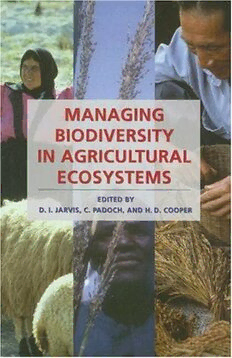Download Managing Biodiversity in Agricultural Ecosystems PDF Free - Full Version
Download Managing Biodiversity in Agricultural Ecosystems by D. I. Jarvis, C. Padoch, H. D. Cooper in PDF format completely FREE. No registration required, no payment needed. Get instant access to this valuable resource on PDFdrive.to!
About Managing Biodiversity in Agricultural Ecosystems
Managing Biodiversity in Agricultural Ecosystems takes a look at how farmers manage, maintain, and benefit from biodiversity in agricultural production systems. The volume includes the most recent research and developments in the maintenance of local diversity at the genetic, species, and ecosystem levels. Chapters cover the assessment and farmer management practices for crop, livestock, aquatic, and associated diversity (such as pollinators and soil microorganisms) in agricultural ecosystems; examine the potential role of diversity in minimizing pest and disease pressures; and present studies that exemplify the potential nutritional, ecosystem service, and financial values of this diversity under changing economic and environmental conditions. The volume contains perspectives that combine the thinking of social and biological scientists. Inappropriate or excessive use of inputs can cause damage to biodiversity within agricultural ecosystems and compromise future productivity. This book features numerous case studies that show how farmers have used alternative approaches to manage biodiversity to enhance the stability, resilience, and productivity of their farms, pointing the way toward improved biodiversity on a global scale. As custodians of the world's agricultural biodiversity, farmers are fully invested in ways to create, sustain, and assist in the evolution and adaptation of a variety of plant and animal species. Thus this text is mandatory reading for conservationists, environmentalists, botanists, zoologists, geneticists, and anyone interested in the health of our ecosystem.
Detailed Information
| Author: | D. I. Jarvis, C. Padoch, H. D. Cooper |
|---|---|
| Publication Year: | 2007 |
| ISBN: | 231510004 |
| Pages: | 508 |
| Language: | English |
| File Size: | 7.244 |
| Format: | |
| Price: | FREE |
Safe & Secure Download - No registration required
Why Choose PDFdrive for Your Free Managing Biodiversity in Agricultural Ecosystems Download?
- 100% Free: No hidden fees or subscriptions required for one book every day.
- No Registration: Immediate access is available without creating accounts for one book every day.
- Safe and Secure: Clean downloads without malware or viruses
- Multiple Formats: PDF, MOBI, Mpub,... optimized for all devices
- Educational Resource: Supporting knowledge sharing and learning
Frequently Asked Questions
Is it really free to download Managing Biodiversity in Agricultural Ecosystems PDF?
Yes, on https://PDFdrive.to you can download Managing Biodiversity in Agricultural Ecosystems by D. I. Jarvis, C. Padoch, H. D. Cooper completely free. We don't require any payment, subscription, or registration to access this PDF file. For 3 books every day.
How can I read Managing Biodiversity in Agricultural Ecosystems on my mobile device?
After downloading Managing Biodiversity in Agricultural Ecosystems PDF, you can open it with any PDF reader app on your phone or tablet. We recommend using Adobe Acrobat Reader, Apple Books, or Google Play Books for the best reading experience.
Is this the full version of Managing Biodiversity in Agricultural Ecosystems?
Yes, this is the complete PDF version of Managing Biodiversity in Agricultural Ecosystems by D. I. Jarvis, C. Padoch, H. D. Cooper. You will be able to read the entire content as in the printed version without missing any pages.
Is it legal to download Managing Biodiversity in Agricultural Ecosystems PDF for free?
https://PDFdrive.to provides links to free educational resources available online. We do not store any files on our servers. Please be aware of copyright laws in your country before downloading.
The materials shared are intended for research, educational, and personal use in accordance with fair use principles.

